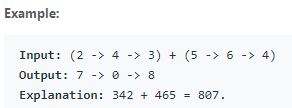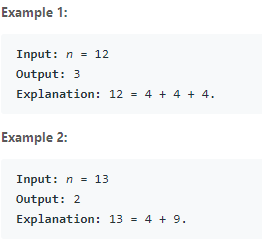2. Add Two Numbers
You are given two non-empty linked lists representing two non-negative integers. The digits are stored in reverse order and each of their nodes contain a single digit. Add the two numbers and return it as a linked list.
You may assume the two numbers do not contain any leading zero, except the number 0 itself.
public class Solution {
public ListNode addTwoNumbers(ListNode l1, ListNode l2) {
ListNode c1 = l1;
ListNode c2 = l2;
ListNode sentinel = new ListNode(0);
ListNode d = sentinel;
int sum = 0;
while (c1 != null || c2 != null) {
sum /= 10;
if (c1 != null) {
sum += c1.val;
c1 = c1.next;
}
if (c2 != null) {
sum += c2.val;
c2 = c2.next;
}
d.next = new ListNode(sum % 10);
d = d.next;
}
if (sum / 10 == 1)
d.next = new ListNode(1);
return sentinel.next;
}
}
Improved. O(1) space complexity Java solution if the interviewer agree with modification of list1.
Step1: sum curr1+ curr2, update carry,
Step 2: update curr1,
Step 3: if curr1.next == null, connect two list, therefore, we only need 1 pointer.
Step 4,5: update the remainder list and add 1 at last.
/**
* Definition for singly-linked list.
* public class ListNode {
* int val;
* ListNode next;
* ListNode(int x) { val = x; }
* }
*/
class Solution {
public ListNode addTwoNumbers(ListNode l1, ListNode l2) {
if(l1 == null) return l2;
else if(l2 == null) return l1;
ListNode dummy = new ListNode(0);
ListNode curr1 = dummy;
curr1.next = l1;
ListNode curr2 = new ListNode(0);
curr2.next = l2;
int carry = 0;
while(curr1.next != null && curr2.next != null){ //1. add curr1 and curr2, update carry
curr1 = curr1.next;
curr2 = curr2.next;
int sum = curr1.val + curr2.val + carry;
carry = sum / 10;
curr1.val = sum % 10; //2. O(1) space complexity by update only curr1
if(curr1.next == null && curr2.next != null){//3. if the length of l1 is shorter, connect to l2
curr1.next = curr2.next; // E.g. l1: 2-4; l2:5,6,5
break;
}
}
while(curr1.next != null && carry == 1){ //4. update the ListNode if carry == 1
curr1 = curr1.next;
int sum = curr1.val + carry;
carry = sum / 10;
curr1.val = sum % 10;
}
if(carry == 1){ //5. add ListNode(1) at last
curr1.next = new ListNode(1);
}
return dummy.next;
}
}
279. Perfect Squares
Given a positive integer n, find the least number of perfect square numbers (for example, 1, 4, 9, 16, …) which sum to n.
Summary of 4 different solutions (BFS, DP, static DP and mathematics):
1.Dynamic Programming: 440ms
class Solution {
public int numSquares(int n) {
if (n <= 0)
{
return 0;
}
// cntPerfectSquares[i] = the least number of perfect square numbers
// which sum to i. Note that cntPerfectSquares[0] is 0.
vector<int> cntPerfectSquares(n + 1, INT_MAX);
cntPerfectSquares[0] = 0;
for (int i = 1; i <= n; i++)
{
// For each i, it must be the sum of some number (i - j*j) and
// a perfect square number (j*j).
for (int j = 1; j*j <= i; j++)
{
cntPerfectSquares[i] =
min(cntPerfectSquares[i], cntPerfectSquares[i - j*j] + 1);
}
}
return cntPerfectSquares.back();
}
}
2.Static Dynamic Programming: 12ms
class Solution {
public int numSquares(int n) {
if (n <= 0)
{
return 0;
}
// cntPerfectSquares[i] = the least number of perfect square numbers
// which sum to i. Since cntPerfectSquares is a static vector, if
// cntPerfectSquares.size() > n, we have already calculated the result
// during previous function calls and we can just return the result now.
static vector<int> cntPerfectSquares({0});
// While cntPerfectSquares.size() <= n, we need to incrementally
// calculate the next result until we get the result for n.
while (cntPerfectSquares.size() <= n)
{
int m = cntPerfectSquares.size();
int cntSquares = INT_MAX;
for (int i = 1; i*i <= m; i++)
{
cntSquares = min(cntSquares, cntPerfectSquares[m - i*i] + 1);
}
cntPerfectSquares.push_back(cntSquares);
}
return cntPerfectSquares[n];
}
}
3.Mathematical Solution: 4ms
class Solution {
private int is_square(int n)
{
int sqrt_n = (int)(sqrt(n));
return (sqrt_n*sqrt_n == n);
}
// Based on Lagrange's Four Square theorem, there
// are only 4 possible results: 1, 2, 3, 4.
public int numSquares(int n)
{
// If n is a perfect square, return 1.
if(is_square(n))
{
return 1;
}
// The result is 4 if and only if n can be written in the
// form of 4^k*(8*m + 7). Please refer to
// Legendre's three-square theorem.
while ((n & 3) == 0) // n%4 == 0
{
n >>= 2;
}
if ((n & 7) == 7) // n%8 == 7
{
return 4;
}
// Check whether 2 is the result.
int sqrt_n = (int)(sqrt(n));
for(int i = 1; i <= sqrt_n; i++)
{
if (is_square(n - i*i))
{
return 2;
}
}
return 3;
}
}
4.Breadth-First Search: 80ms
class Solution {
public int numSquares(int n) {
if (n <= 0)
{
return 0;
}
// perfectSquares contain all perfect square numbers which
// are smaller than or equal to n.
vector<int> perfectSquares;
// cntPerfectSquares[i - 1] = the least number of perfect
// square numbers which sum to i.
vector<int> cntPerfectSquares(n);
// Get all the perfect square numbers which are smaller than
// or equal to n.
for (int i = 1; i*i <= n; i++)
{
perfectSquares.push_back(i*i);
cntPerfectSquares[i*i - 1] = 1;
}
// If n is a perfect square number, return 1 immediately.
if (perfectSquares.back() == n)
{
return 1;
}
// Consider a graph which consists of number 0, 1,...,n as
// its nodes. Node j is connected to node i via an edge if
// and only if either j = i + (a perfect square number) or
// i = j + (a perfect square number). Starting from node 0,
// do the breadth-first search. If we reach node n at step
// m, then the least number of perfect square numbers which
// sum to n is m. Here since we have already obtained the
// perfect square numbers, we have actually finished the
// search at step 1.
queue<int> searchQ;
for (auto& i : perfectSquares)
{
searchQ.push(i);
}
int currCntPerfectSquares = 1;
while (!searchQ.empty())
{
currCntPerfectSquares++;
int searchQSize = searchQ.size();
for (int i = 0; i < searchQSize; i++)
{
int tmp = searchQ.front();
// Check the neighbors of node tmp which are the sum
// of tmp and a perfect square number.
for (auto& j : perfectSquares)
{
if (tmp + j == n)
{
// We have reached node n.
return currCntPerfectSquares;
}
else if ((tmp + j < n) && (cntPerfectSquares[tmp + j - 1] == 0))
{
// If cntPerfectSquares[tmp + j - 1] > 0, this is not
// the first time that we visit this node and we should
// skip the node (tmp + j).
cntPerfectSquares[tmp + j - 1] = currCntPerfectSquares;
searchQ.push(tmp + j);
}
else if (tmp + j > n)
{
// We don't need to consider the nodes which are greater ]
// than n.
break;
}
}
searchQ.pop();
}
}
return 0;
}
}

